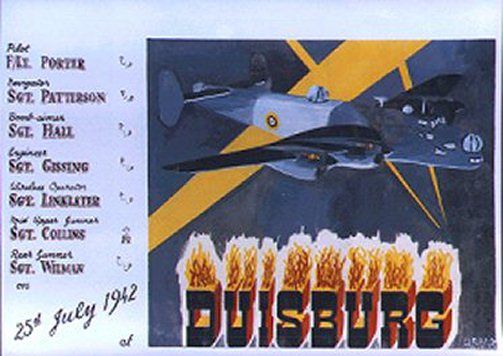 Previous Section |
 Go Back to Chapter Headings |
 Next Section |
One place I'll never forget was a large abandoned brick factory. We were
there for a few days. There were British, Russian and Americans POWs. Every
morning a dozen or so dead Russians were removed. Again the Americans were a
demoralized lot. The factory was extremely dirty and dusty. Mem and I had traded
for 1/2 sack of potatoes and a little cart to carry them on. So we had some
food. The rations were practically nil, maybe a bit of soup. We met an R.A.F.
chap from Lansdorf, George Peterson, he was in very poor shape. He said he had
been with Taffy, also from Lamsdorf, and a Canadian Al Turner, who I had first
met at Wireless School in Calgary. Al had died, and I forgot what George said
had happened to Taffy. Mem and I looked after George and shared our potatoes
with him. George did not have survival instincts. When we asked him to cook some
potatoes, he started to peel them and let the peelings drop on the dirt. We told
him just to wash them off and that he should not have let the peeling fall in
the dirt, because someone would come along and eat them. It was handy to have
George because you could not leave anything unattended or it would be stolen. At
the beginning of the march we had thought poorly of the Russians because they
had to carry everything they owned or their comrades would steal anything
unattended. So we now were in the same state.
We got a Red Cross parcel,
I believe sixteen men to a parcel, this would have meant a couple of biscuits,
or a bit of bully beef or about a few mouthfuls of food. So Mem suggested we
take the coffee, the others were pleased with this, since coffee isn't much
satisfaction to staving men. When it got dark we sneaked out of the factory to
nearby village. After trying many houses we finally got one with some food in it
and we traded the coffee for a large loaf of bread (The Germans hadn't tasted
real coffee for years they only had ersatz coffee which was roasted barley or
rye and generally some slave worker had urinated on it.)
Then we went back to
the brick factory and the bread was a life saver. (I got George's address in
Preston, England and when I got back to Canada I gave it to Al Turner's father
who was the photographer at the Bay in Calgary. He wrote to George and George
gave him all the details of Al's death. Naturally the father was very upset to
learn of the conditions under which Al had died. I was sorry I had put him in
contact with George.)
When we marched out again we left George to look
after himself, as no doubt we had helped him enough to survive. One day as we
were marching, about fifty SS soldiers approached us. They were on well cared
for black horses, and they were all spit and polished in their black SS
uniforms. They were patrolling to find any German soldiers who were deserting
and fleeing away from the Americans. If the SS caught them they were shot forth
with. The deserters would have had a better chance of survival with the
Americans. But at the time who knows.
 Previous Section |
 Go Back to Chapter Headings |
 Next Section |